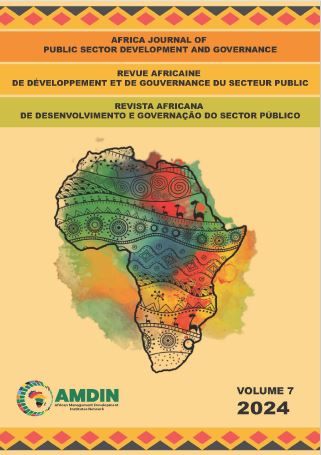Public policy exists for societal governance and development. The articles featured in this Volume 7 edition of the Africa Journal of Public Sector Development and Governance reflect disparate thematic areas of public governance, public administration and their implementation. In this regard, public policy is a common feature that binds these varied aspects together. Ideally, public policy actors from within public institutions and externally are tasked to provide societies with basic needs, good governance and improved economic conditions. Public administration is eclectic in that it is multi-dimensional in outlook and operations (Thornhill and Van Dijk 2010). Thus, “public services” is a conglomerate term that accommodates societal needs from food security to housing and well-being. Even by discipline, the inherent multi-faceted underpinnings of public provisions can predominantly be informed by political science, economics, philosophy, physical science, data analysis, mathematics or public governance.
This article critically examines the public budgeting practices within Kenya’s Ministry of Finance, the key institution responsible for promoting efficient and sustainable public financial management in the country. Adopting a mixed-methods approach, the study combines a comprehensive review of existing literature, reports, and policy documents with a qualitative case study involving in-depth interviews with 20 ministry officials selected through snowball sampling. This dual methodology aims to highlight the persistent challenges within Kenya’s public budgeting framework and propose actionable strategies for its reform. The central research question guiding this study is: How can public budgeting in Kenya be improved?
The findings reveal significant inefficiencies in both budget allocation and execution, compounded by entrenched corruption that severely undermines developmental goals. Funds allocated for essential public services—such as healthcare, education, and infrastructure—are often misappropriated, leaving crucial projects either underfunded or abandoned altogether. The study uncovers a troubling disconnect between budgetary intentions and actual outcomes, pointing to mismanagement exacerbated by a lack of transparency and insufficient oversight mechanisms. These deficiencies create an environment in which corruption thrives, leading to budgetary discrepancies that hinder efforts to address the socio-economic needs of the population. Additionally, the budgeting process is impeded by weak institutional capacity, poor inter-agency coordination, and political interference, all of which complicate efforts to ensure that fiscal allocations serve the public interest.
In response to these challenges, the paper advocates for a comprehensive re-evaluation of Kenya’s public budgeting practices. Key recommendations include strengthening institutional frameworks to enhance accountability, promoting participatory budgeting to better align resources with citizens’ needs, and leveraging digital technologies to improve transparency and tracking of public funds. The study stresses that reforms in these areas could foster a culture of integrity, enhance the efficiency of public financial management, and restore public trust in government fiscal policies. The paper concludes that rethinking Kenya’s approach to public budgeting is essential for achieving the country’s development goals, especially in light of ongoing economic challenges and the growing demand for more equitable service delivery.
Research indicates that decision-makers often overlook the social costs of bulk infrastructure projects because of the challenges in identifying and measuring ‘non-technical’ impacts, resulting in both positive and negative outcomes. In South Africa’s unique socio-political context, examining how water entities conduct Social Impact Assessments (SIAs) is essential for enhancing community engagement, reducing social costs, and ensuring project sustainability. Failing to secure a Social Licence to Operate (SLO) can lead to costly disruptions and a loss of reputation. This study used interviews and focus group project reports to assess the importance of comprehensive SIAs for two major water infrastructure projects and to identify strategies to mitigate societal costs for impacted communities. The findings challenge conventional stakeholder engagement, emphasising socioeconomic factors, diverse participants, and the historical context of development and political trust. This study underscores the significance of collaborative efforts to help community structures better understand complex decision-making processes and their impacts. It is concluded that sharing project information and incorporating authentic community consultations and participatory decision-making can reduce opposition and enhance stakeholder involvement. The findings highlight the need for project implementers to budget for SIAs, adopt a reflexive and ongoing negotiation approach to address intangible and dynamic social constructs and strengthen their interfaces with local structures.
The implementation of a principle-based approach in the execution of organisational activities has the blended effect of augmenting administrative efficiency. This paper explores the relationship between administrative efficiency and a principle-based approach by Ombudsman Institutions in the performance of duties and responsibilities. The paper evaluates the value-enhancing influence of principle-driven Ombudsman Institutions, institutionally, individually and as alternative dispute resolution mechanisms. Qualitative review methods have been employed to gain insight into the invaluable effects of optimally functioning Ombudsman Institutions underpinned by intuitive values. The paper revealed that a principle-based approach by Ombudsman Institutions could be quadruplicated into efficiency, good governance, role-modelling and ethically run Ombudsman Institutions. The paper concludes that Ombudsman Institutions could positively impact increasing higher degrees of standards, efficiency and functioning levels by embracing a principle-based approach.
The purpose of this article is to provide a critical analysis of the implementation of the social housing project called Thembelihle in Tshwane Gauteng Province with the intention of identifying the pitfalls and success factors in implementing this project. A case study method was used to study the project in its natural setting. The case study answered the following questions using the scientific method: How did the stakeholders interact in the implementation of social housing? What are the key challenges and risks experienced in the delivery of social housing? What institutional legal frameworks govern the stakeholders in implementing social housing? What role did the regulatory institutions play in the delivery of social housing? Case study questions were answered through a qualitative data-collection method, which included interviews and documentary reviews.
The findings showed the existence of intergovernmental relations systems that incorporated various stakeholders, such as the Department of Human Settlements, Gauteng Department of Human Settlements, City of Tshwane Metropolitan Municipality, Social Housing Regulatory Authority, Gauteng Partnership Fund, Yeast City Housing and contractors. The findings presented a coordinated approach to project implementation processes, addressing project challenges and the alignment of activities from various stakeholders to produce successful social housing opportunities in the inner city. The project provided an opportunity for beneficiaries to stay close to areas of work, better facilities in the central business district, state-of-the-art hospital facilities, schools and other amenities, reducing the high cost of transportation. The paper recommended that land transfer between spheres of government be seamless and speedily done as it affects project implementation costs. The paper recommended an effective intergovernmental relations framework governing stakeholders and a clear definition of stakeholders’ roles, responsibilities and obligations in the implementation of social housing. The article contributed to the body of knowledge in urban studies as it presented the impact of stakeholder management in addressing urban development matters and the provision of affordable rental housing in the inner city.
Book review/discussion – Liberalism and its Discontents by Francis Fukuyama




